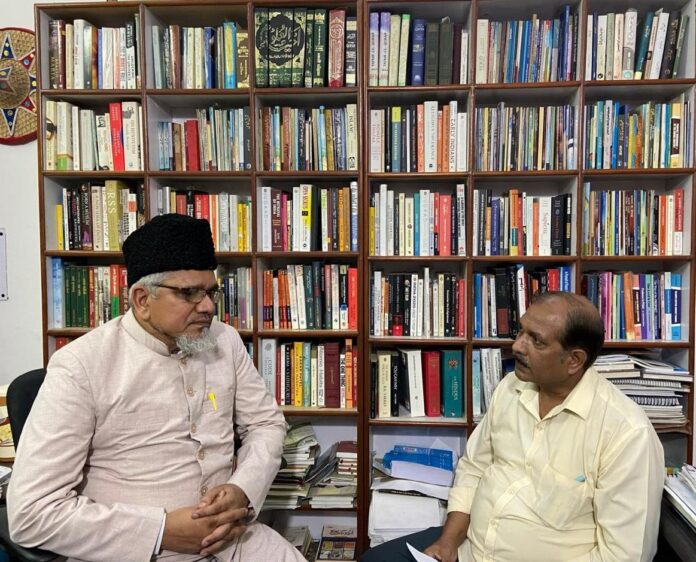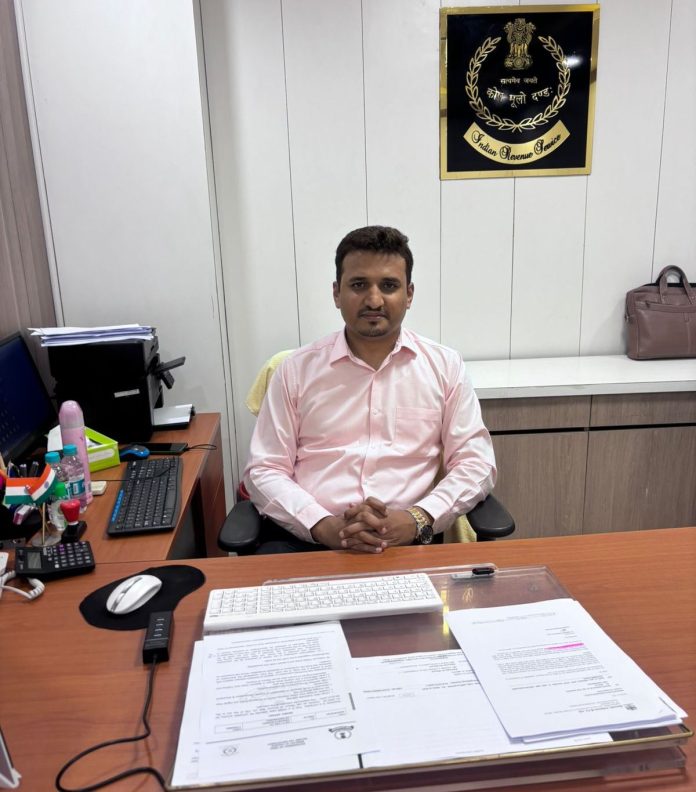Sawai Madhopur District, RAJASTHAN / NEW DELHI :

JIH vice-president Prof Salim Engineer (left).
Jamaat-e-Islami Hind vice-president PROF SALIM ENGINEER is an interfaith leader promoting communal harmony and mutual understanding among members of different faith groups. He is also General Secretary of the Forum for Democracy and Communal Amity (FDCA) and national convenor of the Kendriya Dharmik Jan Morcha, a joint national forum of religious leaders.
In an interview with MOHD NAUSHAD KHAN, he talks about Sadbhavana Manchs floated at the local level across India to promote communal harmony and to create an India where there is peace and communal harmony. Here are the excerpts from the interview.
Question: To inform our readers, please let us know what is Sadbhavna Manch and what are its objectives. And why was it necessary to launch Sabhavna Manches all over the country?
Answer: India is a land of diversity and plurality. People follow different religions and speak different languages. In the last 10 years, communal harmony, unity, brotherhood, and fraternity have become the worst victims in India. Hate and divisive politics have dominated the political discourse. Political parties with vested interests promote their ideology, aiming to shape India into a nation dominated by a single culture and belief system. Discrimination has become their identity; they suppress one community and patronize others who support their ideology. They blatantly try to impose their culture and ideology on all others. All these efforts have badly hit communal harmony, togetherness, and fraternity.
In such a scenario, Jamaat-e-Islami Hind (JIH) felt the need to make people aware of the challenges before the nation. It, therefore, decided to set up Sadbhavna Manches, or what could be called Goodwill Forums in the English language. The objective of the establishment of the Manch was to promote community amity and brotherhood, with representation from different faiths to make India a land of peace in the real sense. The response has been very encouraging and we are moving fast toward achieving our aims. We wish to make India into a “land of peace” through Sadbhavna Manchs across the country.
Question: What should the Sadbhavna Mach do under the current political atmosphere to achieve its basic objectives?
Answer: The Constitution is the foundation of our country. Constitutional values of freedom, liberty, equality, and fraternity should be our guiding principle. The State should not treat any community as superior or inferior, nor should there be any discrimination towards anyone. There must be justice for all. In the present atmosphere, promoting fraternity and brotherhood is highly significant. important. As hate and politics of polarisation have become the core agenda of some political outfits, the role of Sadbhavana Manch has become even more important. We need to politically weaken the divisive forces. At the same time, we also need to work for social transformation through Sadbhjavna Manchs to instill a sense of fraternity, togetherness, mutual trust, and respect to achieve the goal of communal harmony. Without peace and communal harmony,, India’s growth story will remain incomplete; therefore, such forums become very important.
Question: What do you think are the challenges before people or organizations working towards promoting peace and communal harmony?
Answer: During the process of formation of Sadbhavana Manch in different parts of India, we have also formed platforms for religious leaders under the banner of Dharmik Jan Morcha. There is a perception, and baseless propaganda is made, that religion is the root cause of many problems like division in society, hate, and violence. To me, it is a false belief and has no basis. These problems are not because of religion but because of the misuse of religion. The idea behind the formation of Dahrmik Jan Morcha is to dispel the myth against religion and religious leaders. Every religion talks of unity and therefore religion unites and never divides. To keep these challenges in mind, Jamaat-e-Islami Hind has established Dharmik Jan Morcha at the state and central levels comprising notable and respected religious figures from different religions to serve the purpose. Dharmik Jan Morcha is active in a dozen states while Sadbhavana Manch is at the local level and in the coming years around 1000 Sadbhavana Manch will be established across India. We have also decided to have Sadbhavana Manch for women and youth.
With these platforms, we wish to create an atmosphere of peace and communal harmony in the entire society across the nation as a nationwide campaign. At a time when there is an aggressive campaign for hate going on we wish to counter it through love and peace.
Question: In India, more than 85 percent of people want to live in peace. They believe in togetherness, mutual respect, and mutual co-existence. They are tolerant. Yet, the biggest threat India faces is communal harmony. What do you think is the reason?
Answer: Yes, it is true. Those who are trying to spread negativity in society, disturb the peace, and propagate hate and intolerance are few but they are organized and receive political patronage. They believe that they can do anything and get away; they think themselves above the law. They are being praised and even garlanded for their act of crime and violence. Those who want peace are no doubt in large numbers but they are not organized. Most of them are mute spectators, they are not vocal and they don’t raise their voice as and when required. We are trying to make our society proactive through these Sadbhavana Manch and Dharmik Jan Morcha. Unless and until the majority of the people rise and raise their voices against violence, injustice, atrocities, and discrimination, it will be difficult to achieve communal harmony as desired. We are trying to create awareness among those 85 percent to ensure peace and communal harmony. The silence of the vast majority will be tantamount to crime and detrimental to society and the nation at large. We can see that our efforts have a positive impact on society gradually.
Question: After the 2024 Lok Sabha elections, it was believed that the new government will not be as aggressive as before but there is no respite in hate and divisive agenda. How would you like to respond?
Answer: Yes, it is true to some extent but the message of the verdict from the people was loud and clear. It was a verdict against communalism, hate, and divisive politics. The people by and large rejected hate and divisive politics. People voted against where there was hate speech, efforts were made to polarize the people and divide them along communal lines. The message was clear that people won’t tolerate the divisive agenda and hate polity. People want peace and desire to live in mutual co-existence. But there has indeed been no change in the governance despite the clear message of the people against hate and divisive politics. The poison of hate has penetrated deep into the society and it will take years to fade out. It is the duty and responsibility of the government to ensure that the perpetrators of hate and violence are not encouraged but punished. Things will change if we continuously work to promote communal harmony.
Question: Recently, efforts were made in Karnataka to strengthen Sadbhavana Manch and to make it more effective and meaningful. Could you elaborate on it?
Answer: Promoting communal harmony is a core policy of the Jamaat, and efforts were made in the previous term as well. In this term, we are focusing on further strengthening these initiatives. I have travelled across several states to establish new Sadbhavana Manch units and to strengthen the existing ones.
The presidents and secretaries of JIH in various states are actively working toward similar goals. Recently, during my two-week visit to Karnataka, I travelled extensively across more than 20 districts and over 10 cities. We engaged with the local communities, held programmes where Sadbhavana Manch was already established, and created new units. The atmosphere in Karnataka was very positive, and people were eager to embrace and spread the message of Sadbhavana Manch to promote communal harmony.
The Lingayat community, which holds significant influence in Karnataka, was a key focus during our visit. We visited several of their mutts, including the mutt of Basava, the founder of the Lingayat community. In many places, religious leaders themselves organized programs within their mutts, demonstrating a strong commitment to bringing different communities together to foster peace.
source: http://www.indiatomorrow.net / India Tomorrow / Home> News> Society / by Mohd Naushad Khan / August 17th, 2024









